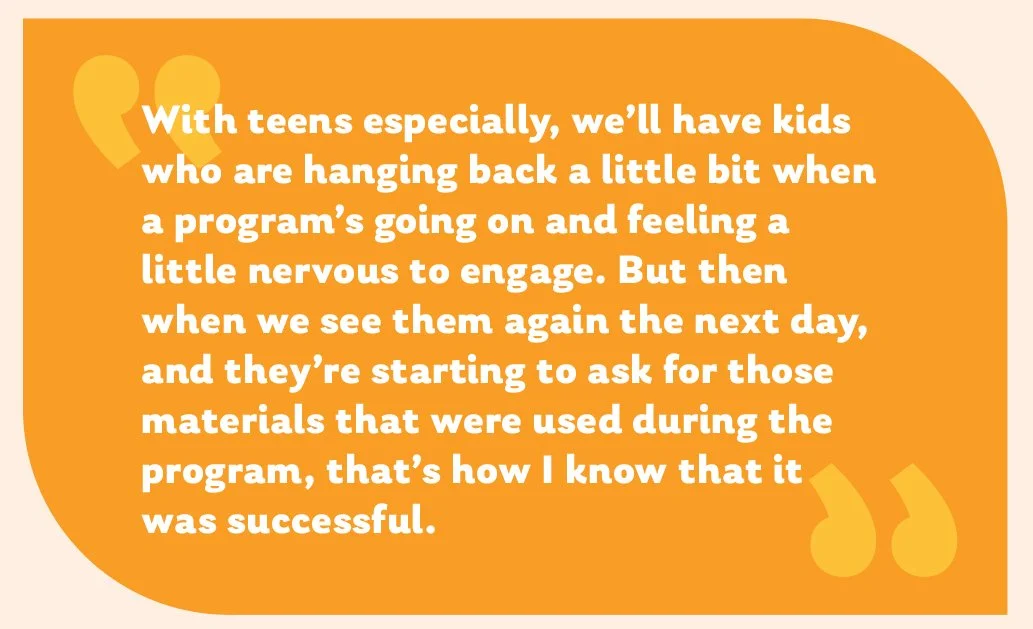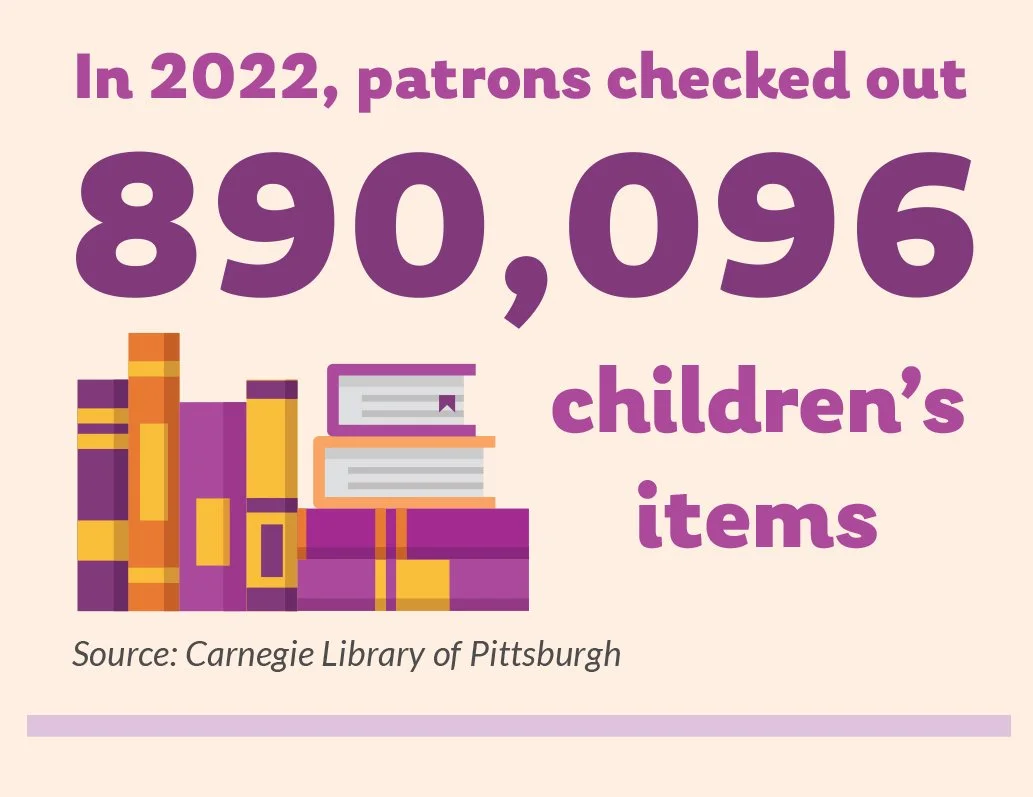Hill District CLP Community-base approach to literacy
Rising Up:
The Hill District Library: Supporting literacy in the community
2023 | Written by Faith Schantz, Report Editor
The Hill District branch of the Carnegie Library, on Centre Avenue in the Middle Hill, looks inviting from the outside, with its glass walls and colorful library logo. On the inside, Library Services Manager for the Hill District Branch Erika Hedin says it’s a joyful space. Sometimes children stop in just for an after-school snack. That’s fine with Hedin, although she hopes they notice that staff members are happy to see them. “Another time when you come in,” she thinks, “you’re going to be thrilled to be here.”
Many children and teens already feel that way about the library. After school, on any given day, between 10 and 20 children and a similar number of teens will be in the children’s area and the teen space, reading, playing games, watching videos, making crafts. Some visit every day. Children can come alone as soon as they’re old enough to follow appropriate library behaviors and their adult family members are comfortable with dropping them off, which varies. “I’ve had eight year-olds and nine year-olds roll in here on their own,” Hedin says. “I’ve also had families who [say], ‘I’m just starting to leave my 12 year-old here.’”
The Carnegie Library of Pittsburgh has 20 locations in neighborhoods across the city, and almost all provide programming for children and teens. As one measure, from January to June 2023, almost 1,200 children, teens, and caregivers attended programs across the system. Library cards are free for city residents, and children, from babyhood, can have their own. According to data provided by the library, patrons checked out a whopping 890,096 children’s items in 2022.
What the library offers
The Hill District branch sponsors Storytime and Playdate (informal play) for newborns up to age five, Kids Club for children in grades K-5, and Teen Choice and Teen Time for those in grades 6-12. As special events, local artist Cue Perry has held workshops for children, and staff from the Pittsburgh Zoo & Aquarium have brought in animals to show. Technology exploration and activities that involve the arts are particularly popular at the branch, but teens also like just hanging out in their space. “Our teen services folks always have activities out even if it’s not a designated program time,” Hedin says.
Library staff have certain goals when they design the content and format of programs. First, the activity should allow participants to build a skill. For example, while children assemble and operate Cubelets robots, they are developing computational thinking. Storytime includes “a literacy tip that gets thrown in pretty seamlessly” for caregivers, Hedin says, such as the value of saying rhymes or making up songs while carrying out everyday tasks. Second, learning should be joyful. Children learn through play, and Hedin points out that applies to all stages of life. “We learn when we want to be there.”
Third, programs should be inclusive and reflect the diversity of the city. More than just materials with Black characters, the staff looks for “an authentic reflection” of the lives of people of color, Hedin says. One of their goals is to share the rich history of the Hill District. Last winter, for adults, the library sponsored a discussion of the book American Sirens, by Kevin Hazzard (who attended via Zoom), about the Freedom House ambulance service, which invented the role of the emergency medical technician. The following week, Kids Club had a related program on what an EMT’s job entails.
To judge how a program is being received, Hedin pays attention not only to the participants, but also to the children on the sidelines. “A lot of times, with teens especially, we’ll have kids who are hanging back a little bit when a program’s going on and feeling a little nervous to engage. But then when we see them again the next day, and they’re starting to ask for those materials that were used during the program, that’s how I know that it was successful,” she says.
The library in the community
Library staff aren’t simply hoping children will stop in. Hedin’s job involves connecting with other organizations and building community partnerships. One is with the Pittsburgh Public Schools. The library system began partnering with the district last year for an initiative called Cardfest. Beginning with Pittsburgh Beechwood PreK-5 and Pittsburgh Milliones 6-12, the district shared students’ names and addresses and library staff mailed cards to any student who didn’t already have one. This year it was expanded to include Pittsburgh Faison K-5, Pittsburgh Miller PreK-5, and Pittsburgh Westinghouse 6-12, with a plan to include all schools by 2024-25.
To encourage children to use their services, library staff visit classrooms to explain to students that the library is “not just books.” With their cards, students can listen to audio books, read nonfiction in a graphic format, get homework help, and learn another language. “Honestly,” Hedin says, “checking out a book is cool, too.” The system gathers data on which online resources children actually use, such as tutor.com or Libby (for online books and other materials). And they can feed information back to teachers about how many of their students are using their cards.
Hill District branch staff members also promote reading in the neighborhoods that surround the library. Before her current position, Hedin was the Youth Services Librarian, and one of her roles was to conduct “Storytime” for local child care centers. One, Kelly’s Kingdom Childcare, had teachers who “were always so wonderfully involved,” such as singing along with the children. “It was really clear that they had a lot of passion for teaching the children that were there,” Hedin says, “but they had very few books.” When the library secured funds specifically for books to give to child care centers, Kelly’s Kingdom was first on the list to receive them.
She was able to connect with more centers after the branch joined the Hill District Early Literacy Initiative, a coalition of groups working together to support literacy for children up to 3rd grade. Being affiliated with the Initiative has helped her overcome the initial reaction of “Who is this person that’s calling me and trying to come into my center?”
A “magic” space
Back at the library, young children are enjoying books by Mo Willems and teens are devouring manga. She’s not the one putting books into their hands anymore, but as Hedin describes it, relationships formed around reading tend to stick. She recalls children coming in after the library had been closed during the pandemic, having grown up in the meantime. The moments of “We know each other, don’t we?” were special, she says.
She’s been there long enough to see a love for reading being passed on in families. One mom has brought her children to the library every Saturday morning for years. Her daughter, who’s in middle school, comes on her own now. Hedin says she loves to read and has her own personal library.
Another patron started coming to the library when he was 12. Now, at 19, he’s a dad. “He’s got his kid coming to Storytime,” she says. “That’s part of the magic of being a space that exists for the community.”
For information on library programs for children and teens, visit carnegielibrary.org/kids-teens.
For children who need help with reading, the Learning Disabilities Association of PA offers free literacy tutoring Saturday mornings at the Hill District library for any child (not just those with learning disabilities) 3rd grade and under.
Teachers and members of community organizations: visit carnegielibrary.org/libraryexperiences to request services.

